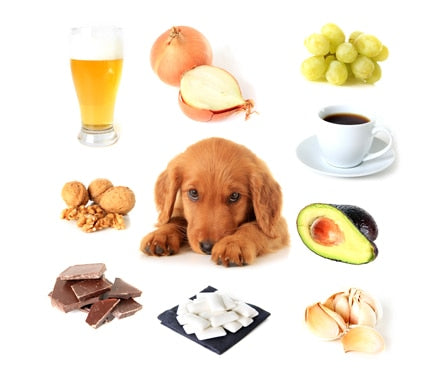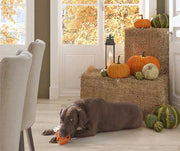Top Household Hazards for Your Pet

If you're reading this article, there's no doubt you love your pet. You want to protect them from any harm, and since they spend the majority of their time in your home, it should be a safe haven. However, there are many dangers within your home that you should be mindful of. Many of these potential hazards are fairly obvious, and are similar to what you would be concerned about if you had a small child in the house. Many common domestic items are specifically dangerous to your furry friends. Whether it's food, pharmaceuticals, or chemicals, keep an eye out for these top household hazards for your pets.

Edibles: Some food products that we regularly consume may not be optimal for our health, but they are usually acceptable in moderation. That is not the case with dogs and cats. Some of these items can be extremely toxic, or even fatal to your dog or cat. Some edibles that are considered healthy for us, can have very negative effects on our pets.
Chocolate: No surprise here. Even if you're not a pet owner, you probably knew this. Chocolate is harmful to both dogs and cats. Due to the caffeine and theobromine, never share chocolate – especially dark – or anything that contains caffeine with your furry friend.
Grapes: Healthy snack for us, but they can cause kidney failure in your dog. Since raisins are dried grapes, be sure to avoid those as well.
Chicken Bones: Although we often think of bones as good treats for dogs, chicken bones can splinter and cause choking in both dogs and cats.
Alcohol: In excess, alcohol is certainly not good for humans. It is never a good idea to give even a little bit to your pet. Like us, it can cause liver damage, but much quicker and more severely. It can also cause acidosis and even brain damage.
Avocado: This is one is highly debated among pet parents. Avocado contains a toxin called persin, which is toxic to many animals. It is always wise to err on the side of caution, and not feed your dog or cat anything that contains avocado – that means no guacamole either.
Fat and Trimmings: While it may be tempting to give your pet a little leftover fat from your steak, it is never a good idea to routinely expose your dog or cat to fatty foods. Fat trimmings from meat, both cooked and uncooked. It can cause pancreatitis, renal failure, and can be difficult for them to digest.
Onions & Garlic: Of these two, onions are definitely more dangerous for your pet. Both garlic and onions contain thiosulphate, which can cause gastrointestinal irritation, and could lead to red blood cell damage, in both dogs and cats.
Xylitol: This is a sweetener found in many common items like gum, candy, baked goods, and toothpaste. Ingestion could lead to liver failure and hypoglycemia. So, be sure to properly dispose of your gum next time it runs out of flavor.
A more in-depth list can be found here.
Medicine and Pharmaceuticals: Unless you've been told by a veterinary professional, medicine meant for humans should never be shared with your pet. Even the most harmless over-the-counter drugs for us can be very toxic to your pets. Make sure these items are all out of reach and be sure to pick up every pill if you drop any on the floor. Even things prescribed to your pet by a veterinarian should be kept inaccessible to your pet. Since these medicines are often flavored, your pet may want to eat the whole bottle if they are able to.
Chemicals and Cleaners: As you might expect, anything that is used to get rid of pests, clean your house, or keep your car running properly should certainly be kept away from pets.
Insecticides & Rodenticides: These items are meant to exterminate pests. Understandably, they could have devastating effects on your pet. Be sure to read the warning labels and store these items properly.
Cleaning Products: Bleach, window cleaners, bathroom cleaners, detergent, and most other cleaning products should not be kept in low areas unless they are properly pet-proofed. You may only think of this being necessary with small children, but pets can be just as curious.
Heavy Metals: paint chips, pennies, and other items found in the house can contain lead and zinc. If ingested, these items can lead to various complications.
Fertilizer & Mulch: Phosphorus and nitrogen are just a couple of the ingredients in fertilizer that can lead to a trip to the vet. Like chocolate, cocoa mulch contains theobromine, and as we mentioned earlier, this is very toxic for your pets. It even smells like chocolate, so pet parents should consider another type of mulch for landscaping.
Antifreeze: With a sweet odor and taste, many pets are attracted to it, but only a few tablespoons can put your pet's life in jeopardy. It only takes a small amount to cause fatal damage to the brain, liver, and kidneys.
Deicers: During the winter months, you might have this product on your sidewalks and driveways. This means your pet may have it on their paws, and if they lick it, it can lead to your pet being poisoned.
Miscellaneous :The chemicals or small parts found in batteries, toys, fabric softener sheets, and certain plants may pose a danger to your furry friend.
If you believe your pet may have ingested any of the items on this list, please contact your veterinarian or a pet poison hotline immediately. ASPCA's Animal Poison Control hotline number is (888)426-4435. If you have to take your pet to the veterinarian, it is recommended that you take a sample of the substance they ingested. You can see the Animal Humane Society's more in-depth list of household dangers to your pet, here.
This list certainly may look a bit menacing, but with a little extra precaution, you can certainly have peace of mind knowing that your pet is safe in your home – as they should be.
Sources:
- Common Household Poisons, Vet Street. 07 March 2014. Web. 03 Feb. 2016
- Most Dangerous Household Items for Dogs, Rover Daily Treat. 25 Nov. 2014. Web. 03 Feb. 2016
- Common Household Dangers for Pets, The Humane Society. 27 Feb. 2015. Web. 03 Feb. 2016
- People Food to Avoid Feeding Your Pets, ASPCA. Web. 03 Feb. 2016
Previous article

Next article

Related posts
View all-

What Is the Most Wanted Dog Accessory?
Every dog owner wants their furry friend to have the best. The options for dog accessories are endless, from comfortable collars to cozy beds. But what is the most wanted item for dogs?
Read Article -

What is the Best Scent to Mask Cat Box Odors?
If you share your home with a cat, you know how important it is to keep their litter box fresh and odor-free. A clean litter box improves your home’s air quality and ensures your furry friend feels comfortable using it. However, masking litter box odors can be tricky, especially if you have more than one cat or the smell of cat urine seems impossible to control.
Read Article -

How To Celebrate National Puppy Day
Let's face it. Puppies are absolutely one of the cutest creatures on this planet. From their fresh puppy breath to their adoring puppy eyes to their loving puppy cuddles, puppies have been capturing the hearts of millions for generations. Read Article



